Home ||
Tanker Safety ||
Container Ship Handling ||
Commercial Management ||
EMS
How to deal with hull damage by stevedores or damage of cargo due improper handling ?
A ship's hull damage occurs during cargo operations generally as a result of negligence by the Stevedore's negligence. Such negligence is usually actionable against the
Charterers. In case a third party including stevedores is responsible for an accident caused by work, such as Cargo handling, Bunkering, or Loading ships stores or the like, the Master should handle the accident with appropriate steps and safeguard ships owner right to claim for damages.
In case a hull damage accident has occurred due to stevedores, the Master and Chief Officer need to take necessary measures.
If possible, the Master should try to have the stevedores repair the damaged portion to restore it to the original state before departure.
If any damage has affected the vessel's seaworthiness, the Master will not depart from the port until suitable repairs are carried out. Moreover, a Class Survey has done as necessary.
The ship's classification process ensures that the ship's hull, hatch covers, lashing bridges,
cell guides, and fixed fittings have sufficient strength. Loose fittings such as container
securing components may be excluded from this certification process. Although a
classification society may assess the adequacy of loose fittings and assign a class notation,
this examination is additional to the mandatory ship classification process.
P&l clubs require a ship to be approved for the carriage of containers by a classification
society and for the container securing arrangements to at least meet that classification
society's design requirements.
Fig: Kyoto express incident
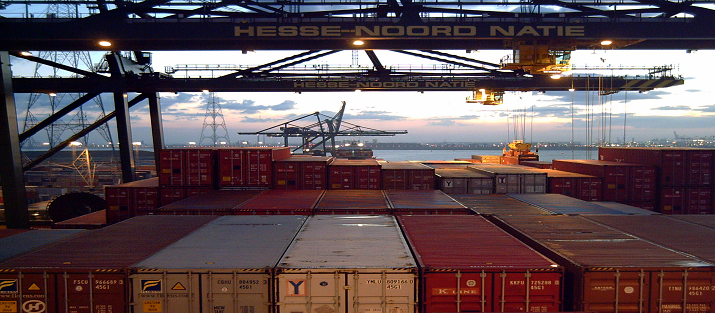
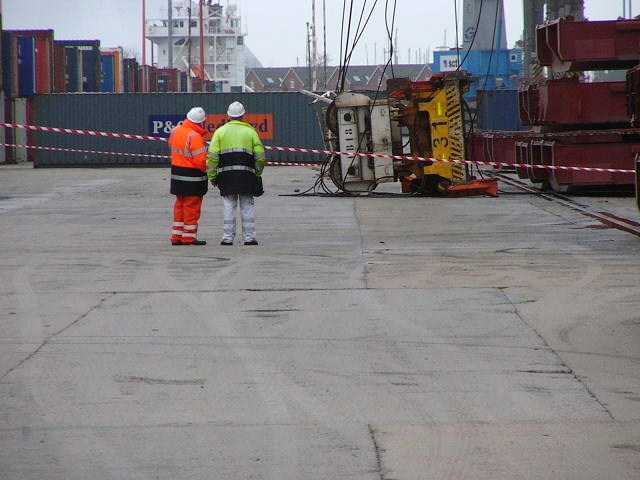

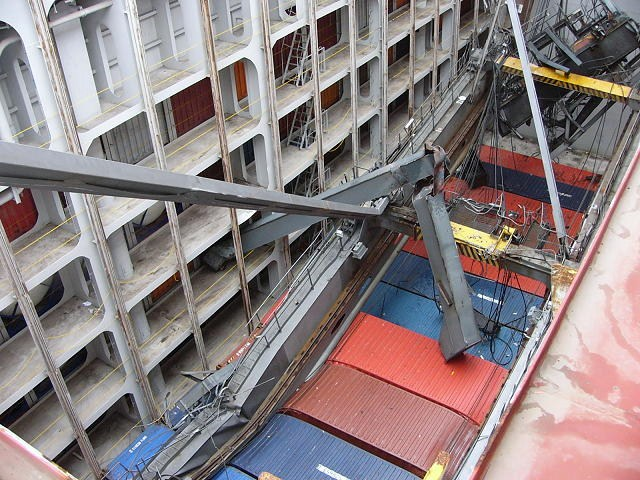
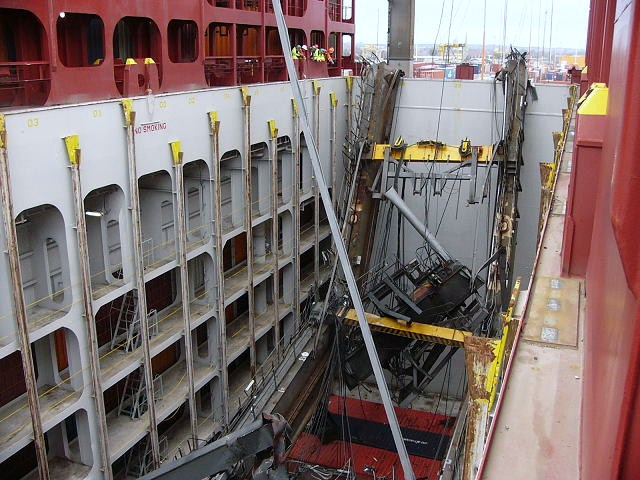
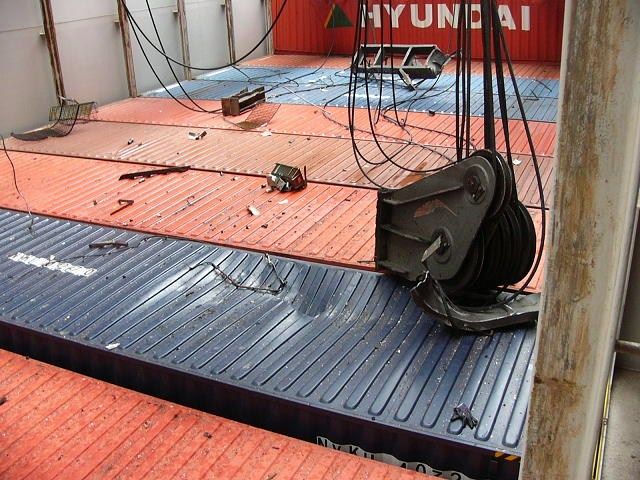
Tender of claim notice
The Master should carry out the on-the-spot investigation with attendance of the Stevedore's side. He needs to tender the Claim Notice (Stevedore Hull Damage Report to the stevedores (Terminal superintendent or Manager only, not foreman) immediately after confirmation of the state of accident, and have him sign it.
If significant damage or one affects seaworthiness, the Master needs to advise the management Company by telephone immediately and, if necessary, prepare a detailed statement.
Sometimes the Claim Notice shall be tendered directly to the Stevedore, other times to the Charterer, depending on the provisions of the Charter Party.
Pay attention to that some Charter Parties require Charterer to be notified within 24 hours after the occurrence of an accident.
Give a copy of the signed Claim Notice to the stevedores and agent and fax or email same to Company and Operator.
Report to company
In all cases of hull damage ships master should notify the management Company without delay of the following:
- Whether damage will affect seaworthiness of the vessel
- Whether cargo operations are / will be affected
- Whether personnel working safety would be affected due to this damage
- Has the damage been repaired by the stevedores or will they repair it next voyage
- Can the damage be repaired by ships staff and is sufficient material available
- Any arrangements like shifting cargo or keeping slots vacant to facilitate repairs
- Will hot work be required and presence of any IMDG cargo in vicinity
- Any scaffolding / staging required for repair and availability on board
While Company should endeavor to have the Operators repair the damage, there may be circumstances when it is requested to be done by ship staff. On receiving such requests from operators, the Company should consider repair by ship staff and instruct the Master to carry out such repair.
Upon completion of the repair, the Master shall advise the office of following:
- Ships name and voyage number
- Date and port where damage occurred
- Location and extent of damage
- Details of repair work carried out
- Material used, also including oxy-acetylene gas, electrodes, paints etc
- Man-hours utilized (separately for repair and painting work)
- Other pertinent remarks.
Arrangement of survey: In severe hull damage cases impacting vessel seaworthiness required the arrangement of a Class Surveyor. To avoid ship sailing delay master should consult with the management Company for smooth arrangement.
Charterers liability on stevedore damages as per standard charter party clauses
- NYPE 46 - "Charterers are to load, stow, and trim the cargo at their expense under
the supervision of the Captain".
- NYPE 93 - "Charterers shall perform all cargo handling, including but not limited to
loading, stowing, trimming, lashing, securing, dunnage, unlashing, discharging, and
tallying, at their risk and expense, under the supervision of the Master."
- Gencon 94- "The cargo shall be brought into the holds, loaded, stowed and
trimmed, tallied, lashed and secured and taken from the holds and discharged by
the Charterers, free of any risk, liability and expenses whatsoever to the Owners.
In the absence of any provision to the contrary in the charter party, usually, the vessel's rail rule will come into play. In modern times, CP clauses will commonly stipulate the division of responsibility.
The above standard clauses require Charterers to load/stowage/discharge the cargo. If the task is
performed negligently by the Charterers' delegate
(the Stevedore), the Charterers are in breach.
In most cases, stevedores often are appointed by charterers, shippers, or receivers. Due to commercial reason, many charterers seek to avoid their liability for stevedore damages by inserting words in the CP such as quote:
"loading and discharging of cargo under the supervision and the responsibility of the master" Unquote or a similar language which provides that charterers are not responsible for any damage caused by stevedores. Examples of such clauses are as follows:
- "Charterers, Shippers, Receivers shall not be responsible for the act and default of the Stevedores at loading/discharging ports. All claims for damage allegedly caused by Stevedores to be settled directly between Owners and Stevedores at loading/discharging ports. Master to notify Stevedores of damage, if any, in writing within 24 hours after the occurrence, otherwise Stevedores should not be held liable."
- "Charterers not to be responsible for Stevedore or other damage to the vessel unless notified in writing by the shipmaster. Such notification to be issued at the time of the occurrence of damage or as soon as practical. The Master is to co-operate with Charterers and Agents in giving prompt Notice of Claim in writing to the party, causing damage and securing their admission of liability. Copy of correspondence, together with the original letter acknowledging liability, if any, to be sent to Charterers. On damage occurring, Master shall immediately report telegraphically to Charterers."
Charterers may not always escape liability as a result of such a clause. Ship owners rarely have any contractual contact with stevedores and thus have no direct recourse against them. It is, therefore, important that a Master read carefully the Charter party clauses regarding stevedore damage and complies strictly. Moreover, if all the documentation covering the incident has not been completed at the time of the incident, recovery may not be possible. Owners P & I club to be notified in time for inspection, advise and recovery of a damage claim.
The Master should also ensure that all unrepaired stevedore damage is noted in any off-hire survey and that charterers are invited to inspect damage repairs being carried out in dry-dock. If the damage is minor and does not affect the vessel's seaworthiness or efficient state, repairs may be deferred to the next dry-docking.
Related articles
2 in 1 container operation in cargo hold
Safe Cargo operation Various guidelines

Other info pages !
Ships Charterparties Related terms & guideline
Stevedores injury How to prevent injury onboard
Environmental issues How to prevent marine pollution
Cargo & Ballast Handling Safety Guideline
Reefer cargo handling Troubleshoot and countermeasures
DG cargo handling Procedures & Guidelines
Safety in engine room Standard procedures
Questions from user and feedback Read our knowledgebase
Home page

ShipsBusiness.com is merely an informational site about various aspects of ships operation,maintenance procedure,
prevention of pollution and many safety guideline. The procedures explained here are only indicative,
not exhaustive in nature and one must always be guided by practices of good seamanship.
Site Use and Privacy - Read our privacy policy and site use information.
//Home //Terms and conditions of use
Copyright © shipsbusiness.com All rights reserved.







